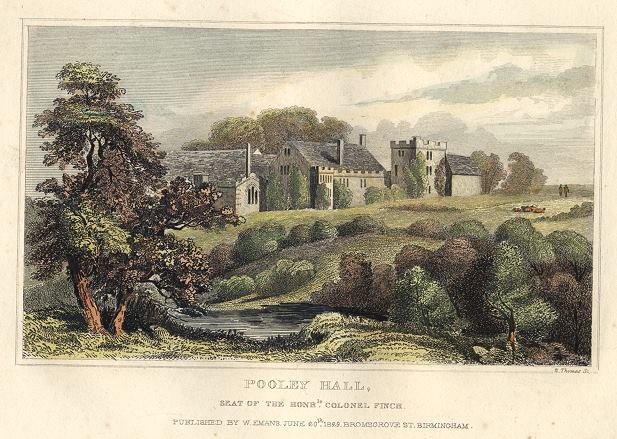Cockayne Baronets on:
[Wikipedia]
[Google]
[Amazon]
 The Baronetcy of Cockayne of Ashbourne was created in the Baronetage of England on 10 January 1642 for Aston Cockayne, Lord of
The Baronetcy of Cockayne of Ashbourne was created in the Baronetage of England on 10 January 1642 for Aston Cockayne, Lord of

 The Cockayne (or Cokayne) family settled at Ashbourne in the twelfth century. Ancestors of the baronet included Sir John Cockayne, steward to
The Cockayne (or Cokayne) family settled at Ashbourne in the twelfth century. Ancestors of the baronet included Sir John Cockayne, steward to
Ashbourne Hall
Ashbourne Hall is a Manor house originally built by the Cockayne family in the 13th century in Ashbourne, Derbyshire. The present building is part of a largely demolished, Georgian-styled hall built in the 18th century.
The Cockayne family
T ...
, Derbyshire and Pooley Hall, Polesworth, Warwickshire.
Sir Aston Cockayne
''Sir'' is a formal honorific address in English for men, derived from Sire in the High Middle Ages. Both are derived from the old French "Sieur" (Lord), brought to England by the French-speaking Normans, and which now exist in French only as ...
was a cavalier and author. He was a friend of King Charles I Charles I may refer to:
Kings and emperors
* Charlemagne (742–814), numbered Charles I in the lists of Holy Roman Emperors and French kings
* Charles I of Anjou (1226–1285), also king of Albania, Jerusalem, Naples and Sicily
* Charles I of ...
and received the title Baronet Cockayne of Ashbourne in return for his support during the English Civil War
The English Civil War (1642–1651) was a series of civil wars and political machinations between Parliamentarians (" Roundheads") and Royalists led by Charles I ("Cavaliers"), mainly over the manner of England's governance and issues of re ...
.
Cockayne family

 The Cockayne (or Cokayne) family settled at Ashbourne in the twelfth century. Ancestors of the baronet included Sir John Cockayne, steward to
The Cockayne (or Cokayne) family settled at Ashbourne in the twelfth century. Ancestors of the baronet included Sir John Cockayne, steward to John of Gaunt
John of Gaunt, Duke of Lancaster (6 March 1340 – 3 February 1399) was an English royal prince, military leader, and statesman. He was the fourth son (third to survive infancy as William of Hatfield died shortly after birth) of King Edward ...
, Sir Edmund Cockayne, slain at the Battle of Shrewsbury
The Battle of Shrewsbury was a battle fought on 21 July 1403, waged between an army led by the Lancastrian King Henry IV and a rebel army led by Henry "Harry Hotspur" Percy from Northumberland. The battle, the first in which English archers ...
in 1403. and Sir John Cokayne
''Sir'' is a formal honorific address in English language, English for men, derived from Sire in the High Middle Ages. Both are derived from the old French "Sieur" (Lord), brought to England by the French-speaking Normans, and which now exist i ...
, a turbulent Lancastrian knight who represented Derbyshire
Derbyshire ( ) is a ceremonial county in the East Midlands, England. It includes much of the Peak District National Park, the southern end of the Pennine range of hills and part of the National Forest. It borders Greater Manchester to the nor ...
nine times in Parliament.
The Cockayne family owned the Manors of Ashbourne Hall
Ashbourne Hall is a Manor house originally built by the Cockayne family in the 13th century in Ashbourne, Derbyshire. The present building is part of a largely demolished, Georgian-styled hall built in the 18th century.
The Cockayne family
T ...
and Pooley Hall.
Sir Aston Cockayne was the first baronet and last of his family line.
The baronetcy passed to the senior line of the Cockayne family and to Aston's first cousin, once removed (son of his first cousin): Caleb Cockayne.
The family fortunes ruined, the Cockayne family ceased using the title in their day-to-day lives, although, the Baronetcy is still claimed by descendants of the Cockayne family today.
Cockayne of Ashbourne (1642)
* SirAston Cockayne
Sir Aston Cockayne, 1st Baronet (1608–1684) was, in his day, a well-known Cavalier and a minor literary figure, now best remembered as a friend of Philip Massinger, John Fletcher, Michael Drayton, Richard Brome, Thomas Randolph, and other w ...
, 1st Baronet
Homes
Ashbourne Hall
Ashbourne Hall is a Manor house originally built by the Cockayne family in the 13th century in Ashbourne, Derbyshire. The present building is part of a largely demolished, Georgian-styled hall built in the 18th century.
The Cockayne family
T ...
* Ashbourne Hall in Derbyshire served as the Cockayne Family seat until its sale in 1671.
Pooley hall
* Pooley Hall, near Polesworth, Warwickshire was the family's country retreat until its sale at the end of the 17th Century.
Sturston Hall Sturston could be
*Sturston, Derbyshire
*Sturston, Norfolk
*Sturston, Suffolk
{{geodis